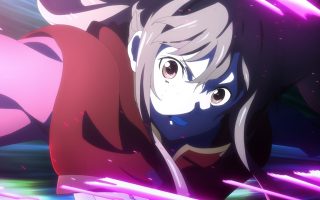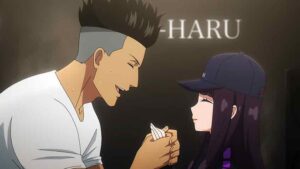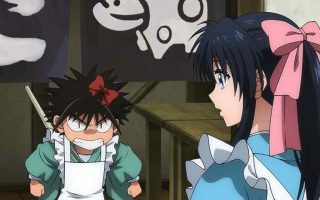I can only reiterate so many times just how great Pluto is. You know my feelings on the subject, and if you’re watching (or watched) it, there’s a good chance you feel the same way. But I really do marvel at the sheer brilliance of the storytelling. Urasawa Naoki is a great mangaka, and coming up with great stories is what they do. Still, I can’t help but wonder what inspired him to take something that was already seminal in Japanese (and not only Japanese) culture and reimagine it like this.
Where this all really soars for me is that Tezuka and Urasawa’s styles and narrative methods could hardly be more different. Yet ultimately the two stories are completely in synch. Urasawa took the original Tetsuwan Atom and flipped it on its head, modernizing it and dramatically changing the tone and structure. And he wound up with a story which asks the same questions and arrives at the same answers as Tezuka, pretty much. It’s even more remarkable in that sense than what Spielberg did with Kubrick’s A.I. (with which Pluto shares a fair bit thematically). Spielberg was taking something unfinished and trying to give it final form in a manner its creator might have done. Urasawa took something that was already not only completed, but revered, and totally reinvented it..
Each of these episodes plays out like a movie, which is exactly what Maruyama Masao (the third titan in the Pluto triad) had in mind. Each of them highlights a thematic element of the show as a whole, and without question in this episode it’s hatred. Hatred is not only something robots inherited from humans. In fact, it seems that hatred is what allows artificial intelligence to transcend the limitations of its creators’ imaginations and become truly sentient. With all that implies.
Gesicht is forced to confront the hatred that’s inside him whether he wants to or not. Despite the best efforts of Dr. Hoffman and Europol to whitewash his memories, he’s now found the terrible truth. He did kill Adolf Hass’ brother. And he did it out of hatred. There’s no question he was a terrible man – not even his brother denies it, and Haas’ wife flat-out says he deserved to die. He kidnapped and murdered robot children, presumably both for money and for revenge over his father (and perhaps another reason too). But in allowing his rage to guide him, Gesicht defied everything that was supposed to be unassailable about robot programming.
Gesicht makes another visit to Braun-1859, though I’m not sure what he hoped to gain from it. It almost seems as if he was forcing himself to look in the mirror, in a sense. The whole Gesicht-Haas storyline revolves around hatred. Adolf hates Gesicht, but that doesn’t stop him from depending on him when his life (or that of his family) is in danger. Hate is a luxury Haas can’t afford (the broader messing is crystal clear here), an act of self-indulgence. His hatred has put he and his wife and son in the crosshairs, and if unchecked it will foil any chance for salvation for any of them.
As for Hercules, his moment of reckoning is coming. He’s come to a sort of peace with Epsilon, an understanding that his own way might not be the right way after all. But he’s “wired for battle” – it’s who he is, and the only means he has to contribute to defeating Pluto. Epsilon can’t help him – that’s not the way he’s wired. All he can do is bear witness to Hercules’ final moments, and pass on whatever he might learn to Gesicht (as he eventually will).
The scene then shifts to Uran, and what a scene it is. She’s become withdrawn and quiet in her grief over Atom’s death, an emotional reaction some humans (though not her principal) still refuse to accept in artificial intelligence. Uran following that chain of sadness upwards – abandoned kitten, bullied boy, confused, old man, finally the greatest sadness of them all – is a brilliant device, simply great writing. Uran traces that deepest sadness to a cemetery, but never catches up to the source. And it’s his sadness that may just be at the heart of everything.
“As if he had to experience the same death twice”. That death was that of Tobio Tenma of course, Dr. Temna’s son. He may be the most brilliant roboticist (and maybe scientist, period) in the world, but where Tobio is concerned Tenma knows nothing but regret. Ochanomizu has received no answer to his pleas for Tenma to come and help him save Atom, but the mysterious genius does finally show up – not, he says, to save Atom but to say goodbye. But for the first time we see a crack in Tenma’s facade. He can’t stand by and do nothing, no matter how he tries to write Atom off as a failure. He confirms that everything Ochanomizu did was perfect, but still the boy robot refuses to wake up.
Tenma spins quite a tale for his successor – of the “perfect robot” he built on commission, and of how he finally decided to try and convince it to wake up. Who is this perfect robot, who paid for him, and where is he? No answers are forthcoming (yet), but Ochanomizu grasps the more immediate import of the story. If they want Atom to wake up, they have to insert “unbalanced” emotions into his neural net as a means for him to deal with that which is A.I. brain is unable to process. There’s no guarantee Atom will come back the same noble child he was – he could, in Tenma’s words, be a “monster”. But is Ochanomizu going to let Atom slip away out of a fear that might happen?
Finally, Gesicht (against orders) goes to the desert to visit the infamous Darius XIV at the U.S.T.’s military prison. This is by far the most overtly political part of the story, especially in the context of when Urasawa wrote it (the early-mid 2000’s) – if you know, you know. Darius tries to commit suicide during Gesicht’s interview, but not before giving Gesicht a few taunting clues about what might really be happening with the world’s great robots. It all fits together seamlessly, and that it does so in a way that reinforces the themes of Tezuka’s original work is one of Pluto’s – and Urasawa’s – greatest triumphs.
The post Pluto – 05 appeared first on Lost in Anime.




